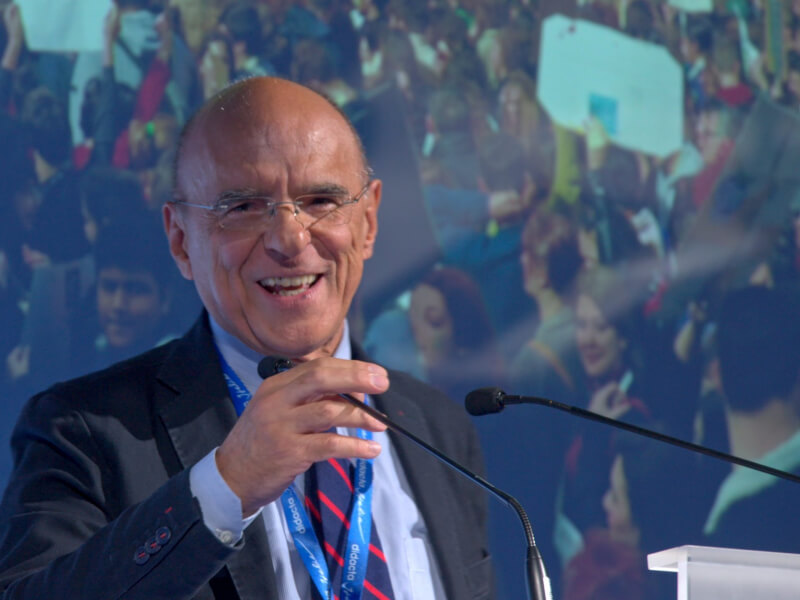02 October 2024 – The United Nations Summit of the Future last week offers a critical opportunity to reflect on the far-reaching consequences of our actions. If we get it right thousands of generations (and literally trillions of people) will inherit a planet where they can thrive. If we get it wrong, through catastrophes of our making – nuclear annihilation, climate change, ecological collapse, pandemics or misaligned artificial intelligence – then the prospects of future generations will be severely limited and they will inherit a dangerously destabilised world.
The United Nations acknowledges this profound responsibility – to a limited extent – in its Pact for the Future adopted last week: “We are confronted by rising catastrophic and existential risks, many caused by the choices we make”
But the summit’s agreed commitments are superficial and lack both ambition and the urgency necessary given the scale of global challenges. The commitments are incremental adjustments to existing systems rather than the rapid, far-reaching transformative solutions that are needed to confront the climate and biodiversity crises. They lack concrete targets given the scale of the challenge. There is too much reliance on existing frameworks rather than proposing bold new mechanisms to drive transformative change. And the finance is sorely lacking. While there are calls for increased climate finance, the scale proposed is likely inadequate to drive the necessary global transitions.
In short, the pact fails future generations.
What is at stake? The existential risks are real. For coastal cities like New York and Shanghai and low-lying islands the water is already at the gates. Sea level may rise a metre or more this century, but it will not stop there, it will keep rising many metres more. For people living close to the equator, their lands will become increasingly uninhabitable as temperatures surpass human tolerance.
But the profound risks are more serious even than this. We have now reached a saturation point on Earth. Humans have become Earth’s dominant force of change. We have hit the ceiling of the biosphere to remain in its stable state: we can say with scientific certainty six of nine planetary boundaries, which keep our planet stable, have been transgressed, with a seventh boundary on the verge.
The Summit of the Future has failed to acknowledge this scientific reality of the risks of transgressing planetary boundaries. Even today we can measure unprecedented changes to the great ice sheets of Antarctica and Greenland, the Amazon rainforest and the Atlantic circulations that distribute heat around the planet. If we want our children to inherit a relatively stable planet then we must do everything in our power to keep fossil fuels in the ground and transform our agriculture and forestry. Today. At the same time we must work on protecting the integrity of all planetary boundaries, from managing biodiversity and freshwater use to ending over-use of fertilizers and deforestation. We are the last generation that can substantially reduce these risks.
The summit’s lack of urgency and commitment does not reflect worldwide public opinion. A recent Ipsos survey commissioned by Earth4All and the Global Commons Alliance showed that the vast majority of people in G20 countries (representing the majority of the global population) are concerned about the state of nature, 69% acknowledge the world is approaching tipping points and almost three in four people (72%) support ecocide laws criminalising large-scale, irreversible environmental damage.
It is wrong to blame the United Nations for the failure of the pact. The UN secretary general Antonio Guturres, like his predecessors, must be applauded for his vision and commitment to ending poverty and addressing the serious existential global risks. But when it comes to real power, his hands are tied. We all know the limitations of the UN – it was created in the aftermath of the Second World War and reflects the power dynamics of that time and it is the sum of its parts – close to two hundred nation states in a chaotic state of competition, cooperation and sporadic aggression.
Rather than slow, incremental change we need bold, decisive action. We argue for the following actions grounded in reality, equity and social justice that also have the force to drive the transformational change needed.
First, we need to recognise the risks to future generations and declare a planetary and human emergency.
Second, we need a major reform of the UN Security Council recognising this fact, and particularly reconfiguring its veto power.
Third, we need to create a high-ambition coalition of nations willing to drive action to respect planetary boundaries and address poverty and inequality in an interrelated way. The goal is to create new international norms to raise goals at a level of ambition aligned with the scientific reality and grounded by principles of social justice and equity.
And finally, given public support for action, we need more democratic accountability at the international level through participatory processes, especially citizen’s assemblies.
This is the start of a transformative agenda, one that aligns with the significant risks we are facing. The United Nations is not an isolated, distant global body. It reflects our collective conscience. Its failure is our failure. Its success is our success.






